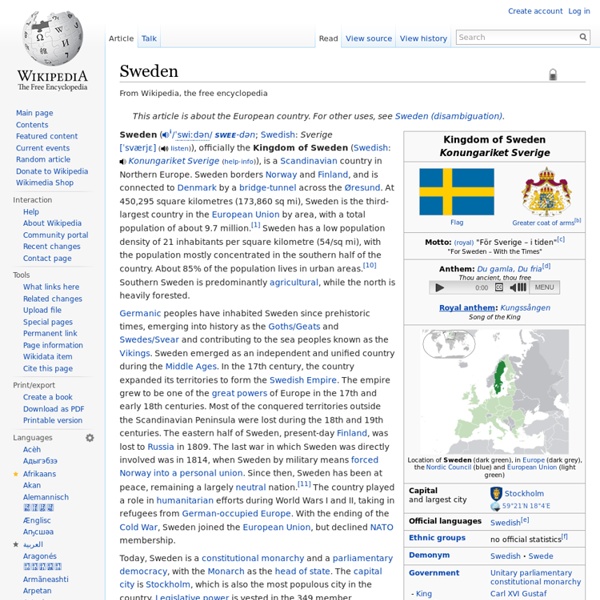History of Sweden
Modern Sweden started out of the Kalmar Union formed in 1397 and by the unification of the country by King Gustav Vasa in the 16th century. In the 17th century Sweden expanded its territories to form the Swedish empire. Most of these conquered territories had to be given up during the 18th century. Pre-historic age: 9,000 BC–AD 800[edit] Sweden, as well as the adjacent country Norway, has a high concentration of petroglyphs (hällristningar[2] in Swedish) throughout the country, with the highest concentration in the province of Bohuslän and around Gamleby and Västervik in northern county of Kalmar, also called "Tjust" (Peterson 2009). Early Swedish history: 800–1500[edit] For centuries, the Swedes were merchant sea men well known for their far-reaching trade. Viking expeditions (blue): depicting the immense breadth of their voyages throughout most of Europe, North Atlantic and Mediterranean The Vikings from Sweden mainly traveled east into Russia. Modern Sweden: 1523[edit]
Russia
Country spanning Europe and Asia Russia (Russian: Россия, Rossiya, [rɐˈsʲijə]), or the Russian Federation,[c] is a transcontinental country spanning Eastern Europe and Northern Asia. It is the largest country in the world, with its internationally recognised territory covering 17,098,246 square kilometres (6,601,670 sq mi), and encompassing one-eighth of Earth's inhabitable landmass. In 1991, the Russian SFSR emerged from the dissolution of the Soviet Union as the independent Russian Federation. Etymology History Early history The ancestors of Russians are among the Slavic tribes that separated from the Proto-Indo-Europeans, who appeared in the northeastern part of Europe c. 1500 years ago.[53] The East Slavs gradually settled western Russia in two waves: one moving from Kiev towards present-day Suzdal and Murom and another from Polotsk towards Novgorod and Rostov. Kievan Rus' In the 10th to 11th centuries, Kievan Rus' became one of the largest and most prosperous states in Europe. Cold War
Greece
Greece (Greek: Ελλάδα, Elláda, pronounced [eˈlaða] ( )), officially the Hellenic Republic (Ελληνική Δημοκρατία [eliniˈci ðimokraˈti.a] Ellīnikī́ Dīmokratía)[11] and known since ancient times as Hellas (Greek: Ἑλλάς), is a country in Southern Europe.[12] According to the 2011 census, Greece's population is around 11 million. Athens is the nation's capital and largest city. Modern Greece traces its roots to the civilization of Mycenaean Greece and is considered the cradle of all Western civilization. As such, it is the birthplace of democracy,[16] Western philosophy,[17] the Olympic Games, Western literature and historiography, political science, major scientific and mathematical principles,[18] and Western drama,[19] including both tragedy and comedy. Etymology The names for the nation of Greece and the Greek people differ from the names used in other languages, locations and cultures. History Earliest settlements to 3rd century BC Hellenistic and Roman periods (323 BC–4th century AD)
London
London i/ˈlʌndən/ is the capital city of England and the United Kingdom.[5] It is the most populous region, urban zone and metropolitan area in the United Kingdom. Standing on the River Thames, London has been a major settlement for two millennia, its history going back to its founding by the Romans, who named it Londinium.[6] London's ancient core, the City of London, largely retains its 1.12-square-mile (2.9 km2) mediaeval boundaries and in 2011 had a resident population of 7,375, making it the smallest city in England. London is a leading global city,[11][12] with strengths in the arts, commerce, education, entertainment, fashion, finance, healthcare, media, professional services, research and development, tourism and transport all contributing to its prominence.[13] It is one of the world's leading financial centres[14][15][16] and has the fifth-or sixth-largest metropolitan area GDP in the world depending on measurement. History Toponymy Prehistory and antiquity Anglo-Saxon London
England
England ( i/ˈɪŋɡlənd/) is a country that is part of the United Kingdom.[1][2][3] It shares land borders with Scotland to the north and Wales to the west. The Irish Sea lies north west of England, whilst the Celtic Sea lies to the south west. The area now called England was first inhabited by modern humans during the Upper Palaeolithic period, but it takes its name from the Angles, one of the Germanic tribes who settled during the 5th and 6th centuries. England's terrain mostly comprises low hills and plains, especially in central and southern England. Toponymy The name "England" is derived from the Old English name Englaland, which means "land of the Angles".[10] The Angles were one of the Germanic tribes that settled in Great Britain during the Early Middle Ages. An alternative name for England is Albion. History Prehistory and antiquity The earliest known evidence of human presence in the area now known as England was that of Homo antecessor, dating to approximately 780,000 years ago.
Paris
Paris (UK: /ˈpærɪs/; US: i/ˈpɛərɪs/; French: [paʁi]) is the capital and most populous city of France. Situated on the Seine River, in the north of the country, it is in the centre of the Île-de-France region, also known as the région parisienne, "Paris region". The Paris Region has a GDP of €612 billion (US$760 billion) in 2012, ranking it as one of the wealthiest five regions in Europe; it is the banking and financial centre of France, and contains the headquarters of 30 companies in the Fortune Global 500. Paris is the home of the most-visited art museums in the world, the Louvre, as well as the Musée d'Orsay, noted for its collection of French Impressionist art, and the Musée National d'Art Moderne, a museum of modern and contemporary art. Paris is known for its fashion designers and the twice-yearly Paris Fashion Week, and for its haute cuisine, and three-star restaurants. §History[edit] §Etymology[edit] §Origins[edit] Gold coins minted by the Parisii (1st century BC)



